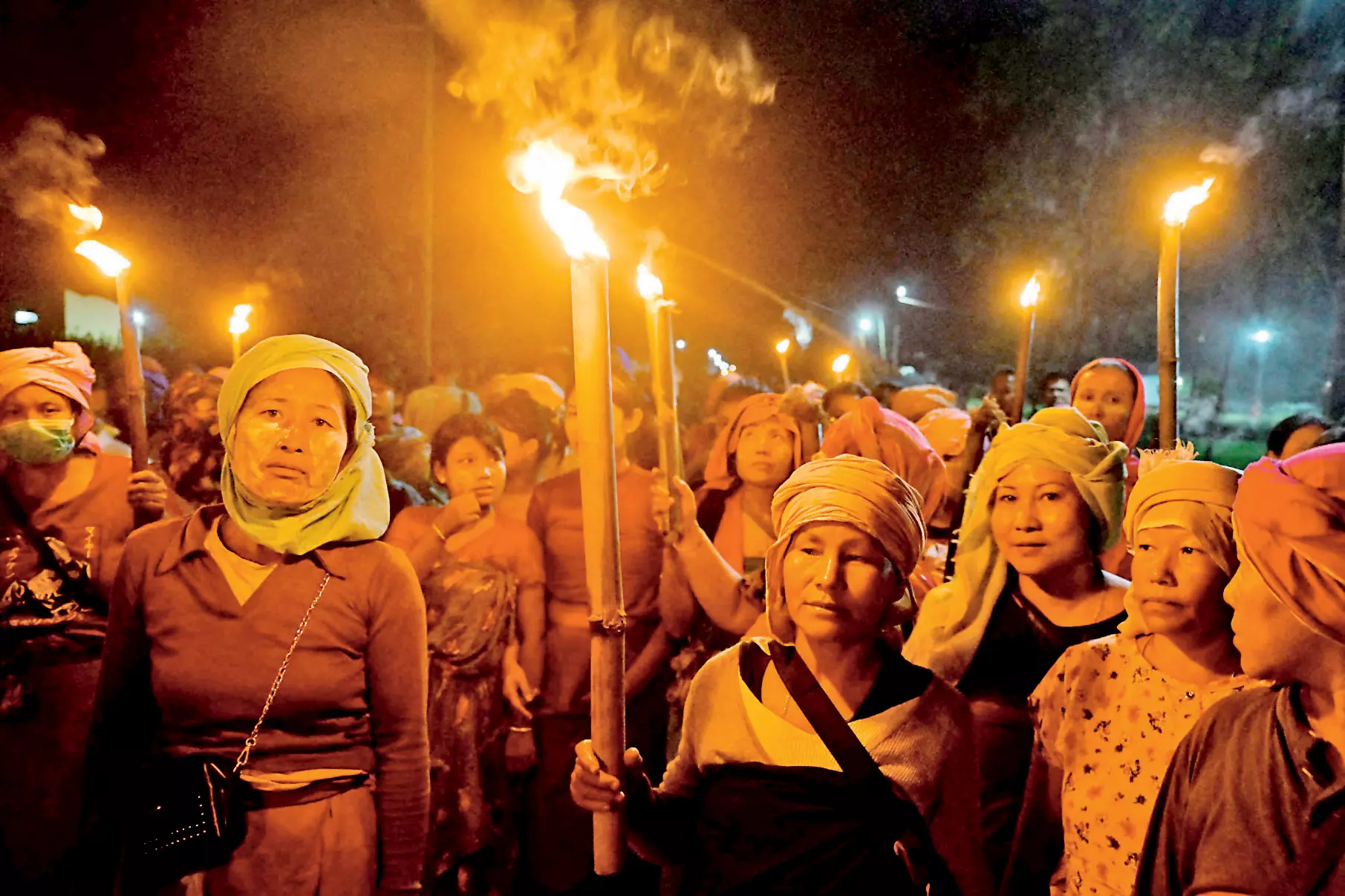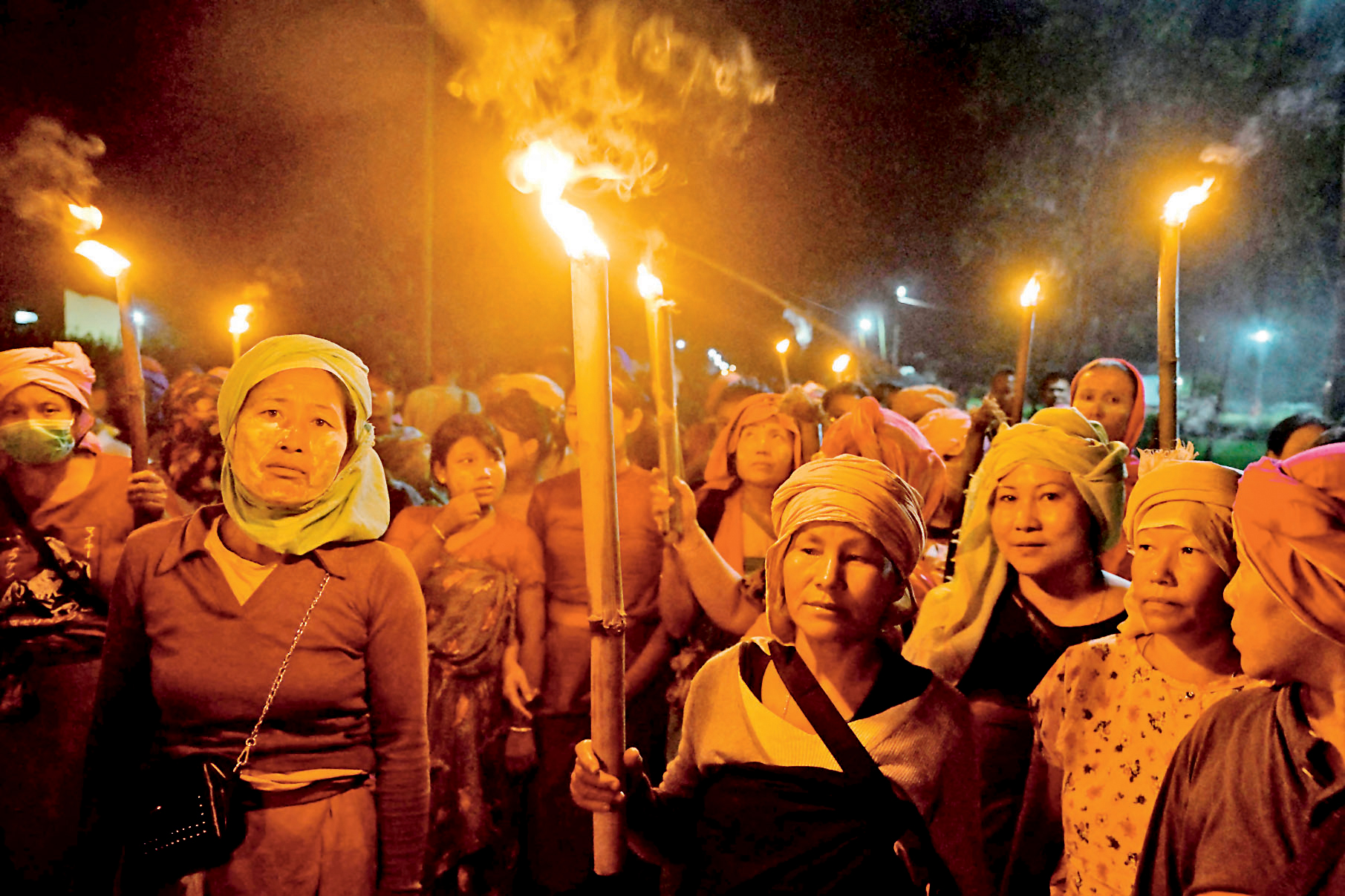
In the full-scale ethnic war between the Meiteis and the Kukis that Manipur has been witnessing since May 3, 2023, the one thing that has come as a surprise is that neither side has been hit by conflict fatigue although the blistering fight has entered its 18th month. In this period, around 250 people belonging to both communities have been killed and an estimated 60,000 displaced, who are now living in relief camps, many of them just makeshift facilities. If no side is willing to end the battle or have a dialogue, it means this is a turf war that Manipur is actually witnessing.
The latest bout of violence was triggered by the brutal killing of a Hmar woman (Hmars belong to the Kuki-Zo ethnic group) in Manipur’s Jiribam district in the first week of this month. The Kukis were obviously agitated. On November 11, armed men, which the Manipur police described as “Kuki militants”, apparently attacked a CRPF post near Borobekra in Jiribam district. The CRPF men retaliated, and according to the Manipur police, the gunbattle continued for 45 minutes. A search of the area later led to the recovery of sophisticated weapons and 10 bodies of what the Manipur police said were “Kuki militants”.
The same day, November 11, armed men had kidnapped a Meitei family whose home was in the shootout vicinity. The hostages were six people: three women and three children, including a 10-month-old infant. Five days later, on November 15, their bodies were picked up from a river in the area. All hell broke loose. On November 16, as soon as news trickled out of the six hostages being murdered, including the 10-month-old infant, women first gathered outside the iconic Ima Market in Imphal, a market run exclusively by women since the 16th century and a venue of many protests in Manipur’s capital. As the day progressed, Imphal was under the grip of thousands of protesters who started blaming the BJP-led government led by chief minister N. Biren Singh of having failed to protect lives and property. Soon, the mobs were on a rampage. They first attacked the residence of BJP MLA Imo Singh, who incidentally is the chief minister’s son-in-law. One after the other, the mob vandalised and burnt the homes of at least nine other ministers and MLAs, including the private residence of Mr Biren Singh. A woman MLA, S. Kebi Devi, was seen on television running on the street to escape a mob and hurriedly got into a bullet-proof police vehicle.
For the first few hours on November 16, the state authorities clearly gave out an impression they were helpless as the mobs went unchallenged. Only late in the evening, the Manipur government brought the Meitei heartland, the Imphal Valley comprising five districts, under curfew and suspended Internet services. The Biren Singh government’s dilemma was clear — at a time when the Kukis have been openly expressing their lack of faith and confidence in the Biren Singh government, the chief minister and his team in Imphal were in no position to antagonise their main support base, the Meiteis. By this time, the Centre, particularly the Union home ministry and home minister Amit Shah himself, had gone into a huddle over Manipur.
A few quick fire-fighting measures were set in motion – the Centre dispatched 70 additional companies of paramilitary forces, and rushed the director-general of the CRPF and the GOC of the Army’s Dimapur-based 3 Corps to Manipur. In New Delhi, home minister Amit Shah reviewed the situation twice in 24 hours. But Mr Biren Singh and his alliance was facing the heat and pushed to the wall. One of the BJP’s key partners, the National People’s Party (NPP), withdrew support, leaving only the Naga People’s Front and the JD(U), besides a few Independents, with the coalition. NPP leader Conrad Sangma, the Meghalaya CM, shot off a blunt letter to BJP president J.P. Nadda saying that his party has lost confidence in Biren Singh’s leadership and that the NPP was deeply concerned about the situation in Manipur. The withdrawal of support by the seven NPP MLAs have had no impact on the Biren Singh ministry as it has the numbers, but the NPP pullout sent out a message that Biren Singh was losing the faith of many, including his allies.
Biren Singh and his team had to come up with a response. The chief minister called a meeting of alliance MLAs on November 18 and adopted an eight-point resolution. The resolution amounted to Team Biren Singh giving a seven-day deadline to the Centre to launch a full-scale operation against “Kuki militants”, withdraw the Armed Forces (Special Powers) Act from the six police station areas where it was reimposed recently, hand over the case related to the killing of the six Meitei hostages in Jiribam to the National Investigation Agency, and declaring the “Kuki militants” responsible for the killing of the six hostages as an unlawful organisation. The resolution recorded a veiled threat saying if the demands were not met within the stipulated time of seven days, the BJP-led alliance with decide on their future course of action in consultation with the people.
In trying to come up with a response, Biren Singh and his team almost ended up adopting a confrontationist approach with New Delhi. Team Biren also had to send out a message to those who have been taking to the streets in Imphal that the state government would not always take things lying down. Therefore, the meeting with the alliance MLAs decided to set up a “high-powered committee” to probe the mob violence that targeted the ministers and MLAs and had destroyed property and vowed to initiate legal action against the perpetrators.
But the biggest conglomerate of civil society groups in the Imphal Valley, the Coordination Committee on Manipur Integrity (COCOMI), that had so far been backing Team Biren, rejected the eight-point resolution and acted by shutting down some Central government offices in Imphal. On Wednesday, however, COCOMI announced the suspension of its agitation for a week as the state government leaders had set the seven-day deadline to the Centre to initiate action against the “Kuki militants”.
The situation remains volatile, it may be impossible to bring things to normal within the deadline of seven days, and the angst of the people against the N. Biren Singh government as well as the Centre may keep Manipur on the boil for some more time to come. This is because the clashing sides are not prepared yet to face each other and talk peace, and neither has there been any serious mediation effort.
